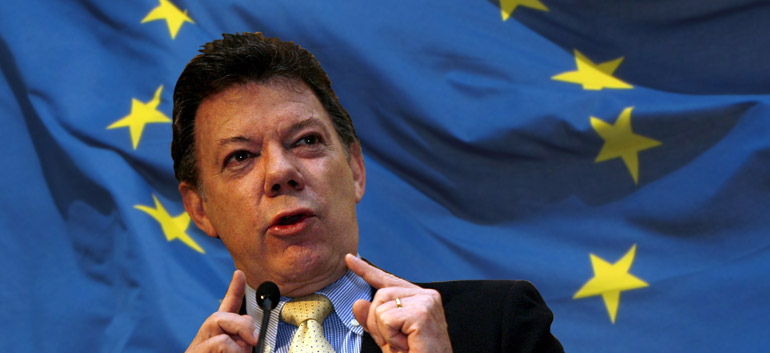President Juan Manuel Santos began a five-day marathon tour of Europe on Monday, aiming to secure political and economic support for post-conflict Colombia in the event that a peace deal is reached with the FARC guerrillas.
Kicking-off the tour in Madrid, Spain, the Colombian president said through a statement on his website that he would be seeking political support for the two remaining topics on the agenda of the peace talks, which began in 2012.
Referencing the issues of the end of the conflict and justice for the victims, Santos said that “here we are facing difficult decisions and we need political support to be able to make them, so that we finally achieve peace in Colombia.”
Santos also mentioned the need of economic support from the European Union in order to finance post-conflict measures and programs in the South American country.
“We are not yet asking for resources, but that sufficient steps are taken to legally constitute a fund that will be one of the funds used to finance the project of the post-conflict [recovery],” the president said. Santos said Spain supports the creation of a European fund, though has not committed a specific amount.
After his stop in Spain, where he also was scheduled to meet with King Felipe VI, Santos will then meet with officials in Brussels, Berlin, Paris, London, and Lisbon, according to Spanish newspaper El Pais.
Regarding relations between Colombia and the Spanish government, Santos told Spanish news outlet ABC that they are “privileged” and “very good, especially in recent years.”
The Colombian president thanked Spain for all it has done and does for the country, and said the European country is a model for modernizing his own.
MORE: Spain lawmakers support Colombia peace process
He also noted that Spanish companies operating in the country are “content” and that the market is good for those who wish to invest.
German government-owned development bank KfW announced Monday that it would be providing $100 million in credit for post-conflict reconstruction in Colombia.
It also said it would be prepared over the next two years to approve more loans to “support concrete reform measures for the application of Colombian peace agenda,” according to W Radio. The disbursement of the funds would be tied to compliance with those reforms.
Santos is seeking some $45 billion in aid over the next decade, according to the AP.
Beyond Europe
In September, President Santos made an appeal to the international community in New York at the UN General Assembly to support the Colombian peace process, which included a meeting with General Secretary Ban Ki-Moon on the topic.
MORE: Santos promotes Colombia peace talks at UN General Assembly
“When we arrive in a post-conflict period, we will have many challenges reincorporating the demobilized combatants, guaranteeing state presence in the regions affected by the conflict, and guaranteeing citizen security. Support and assistance from the international community will be very important, which starting now, we are requesting,” he said during his address to the General Assembly.
Santos has expressed the view that private sector investment will be important in financing post-conflict projects in Colombia.
MORE: Private companies will play key role in Colombia peace plan if Santos gets his way
Besides the European Union, Santos has also received support from the United States government in his efforts to achieve peace with the FARC guerrillas.
Earlier this month, he had conversation with US President Barack Obama in which his American counterpart “reiterated no only his support for the peace process but also for the post-conflict [recovery].”
|
MORE: Obama reiterates support for Colombia peace process: Santos
The FARC and the Santos administration have been engaged in formal peace talks since November 2012. The warring parties have so far reached agreement on rural reforms, political participation and drug trafficking.
The negotiators are now talking with and about victims to determine how to allow them justice and closure. If and when the delegations find agreement on this, the state and rebel military commanders will coordinate the final end to the conflict that has killed more than 220,000 Colombians.
Sources
- Presidente Santos inicia gira europea para buscar apoyo político al posconflicto (President’s Office)
- Santos inicia en España su gira europea para financiar la paz (El Pais)
- Juan Manuel Santos, presidente de Colombia: España es el modelo para modernizar mi pais (El Pais)
- Banco alemán anuncia crédito de 100 millones de dólares a Colombia para el proceso de paz (W Radio)
- Colombia recaba apoyo de España a proceso de paz (AP)
- España apoya creación del fondo de la Unión Europea para el posconflicto: Presidente Santos (President’s Office)
- “Soy el peor enemigo que las FARC han tenido”: Santos (Semana)


